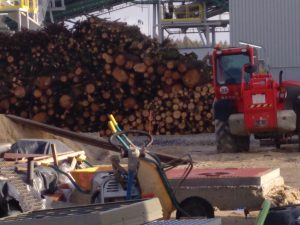15th September 2020 – An investigative report [1] published today by the environmental NGOs Biofuelwatch [2] and Salva la Selva [3] raises serious questions about the European Investment Bank’s (EIB) due diligence process related to a €60 million loan for a biomass power station in Galicia, Spain.
The EIB is expected to increase its investment in biomass projects as part of its new energy and climate strategy.[4] Its loan for the wood-burning power station, which opened in Curtis, Galicia at the beginning of this year, represents one of its largest investments in biomass so far.
Key findings of the NGOs’ analysis include:
Efficiency below minimum standards set out in EU regulations: the power station’s design does not even meet the minimum net efficiency standard set out in the EU Industrial Emissions Directive.
Air emissions specified in EIB-published permitting document breach EU regulations: The environmental permitting document for the plant, uploaded as one of the EIB’s background documents for the loan, specifies air emissions of small particulates which exceed legal EU limits by around 500%.
Unfounded assumption by the EIB that only nearby logging residues would be burned: The EIB justified the loan claiming that only nearby logging residues would be burned. Yet photographic evidence shows that roundwood is being burned, too.
An EIB response to the report, received by the authors prior to publication provides no evidence or documentation contradicting any of the findings.[5]
Report co-author Almuth Ernsting from Biofuelwatch states: “We set out to investigate this project because of wider environmental concerns, previously raised by other NGOs. We were shocked to discover that the EIB appears to have signed off the loan based on flawed data, contradicted in permitted documents it had uploaded on its own website, without noticing that it goes against EU regulations.”
Klaus Schenck from Salva la Selva, based in Galicia, states: “The Curtis biomass plant has been highly controversial amongst environmental NGOs in the region from the start, yet the EIB ignored all of the warnings. Given the findings of our investigations, we believe that the EIB needs to conduct a fundamental review of its support for biomass projects.”
——————— END ———————
Contacts:
Klaus Schenk, Tel: +49-40-41038043, klaus@salvalaselva.org
Almuth Ernsting, Tel: +44-131-6232600, biofuelwatch@gmail.com
Notes:
[1] The report is available at biofuelwatch.org.uk/2020/eib-curtis-biomass-loan-report/
[2] Biofuelwatch is a non-profit organisation that has been carrying out research, advocacy and campaigning around the impacts of large-scale bioenergy since 2006: biofuelwatch.org.uk
[3] Salva la Selva is a non-profit organisation engaged with the conservation of natural forests and the rights of their inhabitants: salvalaselva.org/
[4] See eib.org/en/projects/sectors/energy/index.htm and eib.org/en/press/all/2019-313-eu-bank-launches-ambitious-new-climate-strategy-and-energy-lending-policy

